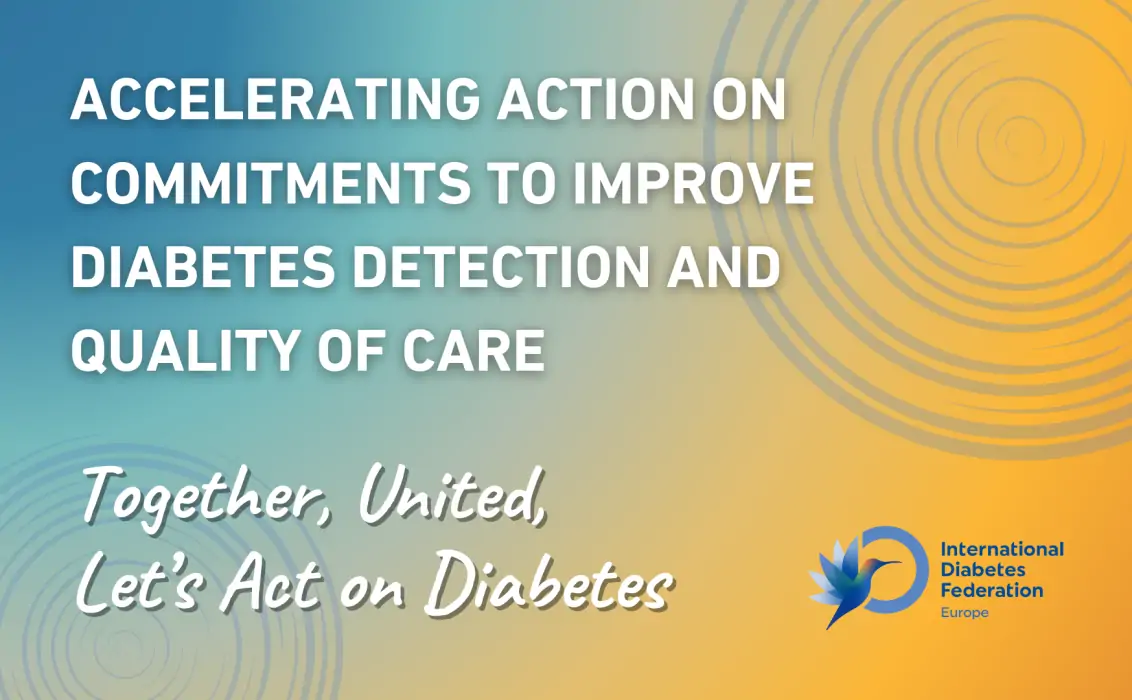- The International Diabetes Federation Europe (IDF Europe) welcomes the outcomes of the High-Level Technical Summit (HLTS) on diabetes, co-organised with WHO Europe in Belgrade and online on 28-29 November.
- The HLTS brought together more than 170 experts from WHO/WHO Europe and IDF Europe with representatives of national health authorities, civil society, health workers and people living with diabetes, to discuss making diabetes a priority in the permacrisis era.
- A Joint Declaration on accelerating action on commitments to improve diabetes detection and quality of care was adopted during the HLTS, which outlines the burden of diabetes and recalls existing United Nations, WHO, EU and other relevant commitments made to address diabetes.
- IDF Europe welcomes this Joint Declaration and calls on all relevant stakeholders, including but not limited to WHO Europe members, to endorse it and respond to this important call to action. It also urges Member States to take further action to fast-track progress.
Co-organised by WHO Europe and the International Diabetes Federation Europe (IDF Europe) in Belgrade and online on November 28-29, the High-Level Technical Summit (HLTS) on diabetes represented a crucial convergence of experts, healthcare professionals, and people living with diabetes. The HLTS gathered about 170 people in Belgrade and online, including representatives from national diabetes associations and Ministers of Health from WHO Europe Member States. Participants took stock of, and shared perspectives on, the detection and diagnosis of diabetes; quality of care, the prevention of complications; and equal access to the right quality treatment.
A Joint Declaration on “Accelerating Action on Commitments to improve Diabetes Detection and Quality of Care” was adopted during the HLTS, which recognises the significant commitments made by Member States to reduce premature mortality and improve the detection, diagnosis and treatment of diabetes in the WHO European Region.
Despite these efforts, the number of people living with diabetes in the WHO European Region continues to rise. According to IDF Europe estimates, one third of people living with diabetes remains undiagnosed, and up to half may not meet their treatment targets.
Therefore, in the line with the 74th World Health Assembly Resolution 74.4 on Reducing the burden of non-communicable diseases (NCDs), the Joint Declaration calls on Member States to take further action to address diabetes, including applying whole-of-government and whole-of-society approaches, raising the priority given to diabetes prevention and control, strengthening policy and regulatory measures, raising awareness of the national public health burden caused by diabetes, ensuring continued focus on treatment and care, and improving prevention and control of diabetes throughout the life course. Additionally, it emphasizes the need to strengthen health systems, improve health literacy, and enhance monitoring and evaluation of diabetes responses.
IDF Europe welcomes this Joint Declaration and calls on all relevant stakeholders, including but not limited to WHO Europe members, to join forces and endorse it. We also urge Member States to take immediate further action to accelerate progress. More specifically, we call on Member States to:
- Root out inequalities through a health-in-all policies, whole-of-society approach, targeting the socio-economic determinants of health, developing health-enabling environments by design and addressing stigma and discrimination across all aspects of life.
- Shift mindsets with earlier action on prevention, diagnosis and management, including a more systematic approach to detecting and diagnosing early all types of diabetes; targeting barriers to the implementation of the latest evidence-based guidelines and guaranteeing universal, affordable, uninterrupted and timely access to all required medicines, technologies, interventions and other tools.
- Embrace research and innovation, through the promotion of data collection and analysis, the digitalisation of healthcare systems, the adoption at scale of innovation in all its forms and the funding of research to address unmet needs.
- Build resilience through the re-design of care systems, notably the strengthening of primary care systems and the development of person-centred, integrated and innovative care models.
- Acknowledge expertise by engaging with, and empowering people living with diabetes. This means promoting their engagement across all aspects of research, care delivery and treatment, better supporting self-management education and digital/health literacy and collaborating in the development of health/diabetes-related policies.
At the end of the HLTS, Professor Prof. Nebojša M. Lalić, IDF Europe Regional Chair, said: “As we envision a future where diabetes is not just managed but mastered, it is essential to unite, collaborate and strategize to address the complex challenges brought by diabetes. For meaningful progress to be made, we must collectively be more ambitious and involve all key stakeholders, especially people living with diabetes whose needs and preferences must guide our strategies to ensure they resonate with real-world needs”.
IDF Europe believes that the HLTS could be a stepping stone for a broader, comprehensive WHO Europe Resolution, to be voted at the Regional Council in 2024.
About IDF Europe
IDF Europe is the European chapter of the International Diabetes Federation (IDF). We are an umbrella organisation representing 73 national diabetes organisations in 46 countries across Europe. We are a diverse and inclusive multicultural network of national diabetes associations, representing both people living with diabetes and healthcare professionals.
Point of contact
Sabine Dupont, Director, Strategy and Policy: sabine.dupont@idf-europe.org or +353 89 708 6565
International Diabetes Federation Europe
Avenue du Bourg. E. Demunter 5 Box 10, B-1090 Brussels, Belgium
www.idf-europe.org



